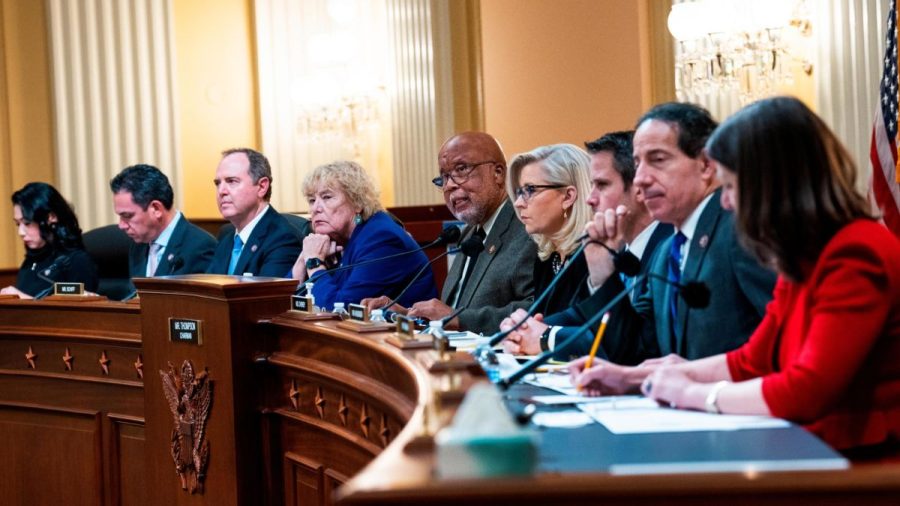EDITORIAL: Investigations into former president Trump’s criminal wrongdoings increasing partisan divide
The Select House Committee investigating former president Donald Trump’s role in the Jan. 6, 2021 insurrection attempt at the Capitol Building will hold its final hearing on Sept. 28.
The Department of Justice (DOJ) is examining classified materials confiscated from former president Donald Trump’s Florida residence Mar-a-Lago as the select committee wraps up hearings on the Jan. 6 insurrection. This is occurring side-by-side with the increased bitterness between Democrats and Republicans as the U.S. nears the midterm elections.
The former president and his allies have been under investigation since June in a slew of ongoing hearings. The hearings regard the involvement of Trump in inciting his supporters to storm the U.S. Capitol building on Jan. 6, 2021.
The insurrection is viewed by non-Trump supporters as a blatant attack on democracy. It occurred in response to Trump’s loss of the 2020 presidential election to President Joe Biden. Trump spread misinformation claiming election fraud, and fears of a non-peaceful transfer of power were realized when his supporters stormed the Capitol building, threatening to inflict harm on many of the Congresspersons inside.
A major goal of Democrats for the hearings is to serve as an example to protect and warn against future attacks on U.S. democracy. Rep. Jamie Raskin of Maryland, a Democrat and member of the Jan. 6 select committee, said, “People want to make sure that we fortify the democracy against coups and insurrections, political violence, and other efforts to usurp the will of the people.”

Along with the Jan. 6 hearings, the DOJ has launched its own investigation into Trump’s possession of highly classified documents, which the law clearly states he should not be in possession of post-presidency. The FBI raided Trump’s Florida residence Mar-a-Lago on Aug. 8, seizing around 11,000 classified documents for “potentially privileged material subject to claims of attorney-client and/or executive privilege.”
The Trump vs. DOJ trial is being ruled by Federal judge Aileen Cannon, who was appointed by Trump. The former president’s detractors claim that the overseeing of the trial by a Trump-appointed judge presents a clear conflict of interest, and Cannon’s rulings thus far have primarily been in Trump’s favor.
Cannon ruled in favor of Trump’s request to appoint a third-party individual known as a “special master” to review all of the thousands of documents confiscated in the FBI raid. After both Trump’s lawyers and the DOJ agreed on his acceptability, New York jurist Raymond Dearie was appointed to be this special master.
Cannon also ruled to bar the DOJ from reviewing the classified documents for investigations prior to the completion of the special master’s review. However, she allowed the Office of the Director of National Intelligence to review them for a noncriminal assessment of their potential threat to national security.
The DOJ asked a federal appeals court to lift the order that bars them from accessing and investigating the classified documents. It wrote that the denial of access “would thus frustrate the government’s ability to conduct an effective national security risk assessment and classification review and could preclude the government from taking necessary remedial steps in light of that review.”
The DOJ’s request was denied, but many note the strategic win on Trump’s part. By delaying the DOJ’s review of the seized documents and the appointment of just one person, Dearie, to sift through all 11,000 documents, Trump hindered the prosecutors and bought himself time to build his defense.
In response to the Mar-a-Lago raid and DOJ investigation, Trump did what he does best: bash his opponents. At his first rally since the raid held in Pennsylvania, he called the FBI and DOJ “vicious monsters.”
He also went on further to call Biden an “enemy of the state.” This was in response to Biden’s Philadelphia speech from just two days prior, in which he warned of the threat to American democracy that Trump and his political ploys pose. “Donald Trump and the MAGA Republicans represent an extremism that threatens the very foundations of our republic,” said Biden.
Biden did note that “not every Republican embraces extreme ideology,” referring to Trump supporters, but he still lashed out at the Republican party for their threats to democracy. It is true that Trump-supporting Republicans made up the crowd of rioters at the Capitol on Jan. 6, and it is true that Trump is the one fanning the flames of conflict with his bullying tactics; however, both Biden and Trump’s speeches have added to the increasing political divide and extremism. The hatred between Democrats and Republicans, from oppositely-affiliated family members to Congresspersons of opposing parties, has tainted the American political system, which once was a system open for compromise between Democrats and Republicans, left and right-leaning individuals.
While the Mar-a-Lago raid and the DOJ investigation of classified documents raise valid questions regarding Trump’s criminality, they have also dominated headlines for weeks, stealing focus from the hearings, which the committee wants to ensure are viewed by Americans across the country. Overly focusing on this one aspect of the investigation detracts from other important pieces of evidence worth considering.
The Jan. 6 committee only has until the end of the year to charter investigations. With the hearings coming to an end, many are drawing conclusions about the involvement of the former president in the insurrection. The final hearing is tentatively scheduled for Sept. 28 unless more evidence against Trump is brought to light. Potential topics of discussion include the delay of deployment of the National Guard during the attack and the security lapses at the Capitol building.
In early October, the committee plans to release an interim report detailing its conclusions from the hearings. With just a few weeks before the midterm elections on Nov. 8, many people, including those Olympic Heights students who are eligible to vote, will have some thinking to do before deciding whose names to check off on the ballot.










